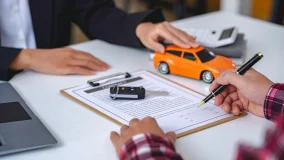Is This Covered by My Auto Insurance?
Auto insurance provides people with a form of financial protection in case something unexpected and costly happens to their vehicle. Liability insurance is a legal requirement and some states require drivers to have both property damage liability and uninsured or underinsured motorist coverage. However, based on your location and personal driving needs, basic auto insurance coverage might not be enough. We previously covered everything you need to know about auto insurance so let’s talk about what will be covered by different types of insurance.
Different Types of Car Insurance
There are several types of auto insurance: personal injury protection, collision coverage, comprehensive coverage, medical payments coverage, uninsured and underinsured motorist coverage, and auto liability coverage. Note that the required coverages may differ depending on where you live but carrying auto insurance is always important. It’s important to understand what type of car insurance is required in your state and what you need from your auto insurance coverage.
My Vehicle Was Damaged in a Natural Disaster
Natural disasters like hurricanes, storms, earthquakes, fires, and floods can have devastating effects on our health and property. However, it is often one of the last things that people consider when building an auto insurance policy. Your car is one of the most valuable assets that you own and having it destroyed or damaged due to a natural disaster is a huge loss. It’s therefore vital that you purchase a car insurance policy that covers you sufficiently in these extreme circumstances.
In the event of a natural disaster, one of the last things that come to mind is your car, unless you need to speed off somewhere fast. But like the rest of your personal property, your car can be damaged or destroyed in a natural disaster. By being proactive and getting additional car insurance coverage that will cover you in the event of a natural disaster, you can save yourself from paying the costly price later.
My Car Was Totaled and I Still Owe Money
Having your car totaled is inconvenient, but having it totaled when you still owe money on it can be financially devastating. With 40% of Americans having car loans, this is not an unlikely scenario. Recently, more and more people have needed to extend the duration of their car loan; the average new car loan has increased to nearly six years. Another fact that we all know is how quickly a car depreciates, which is the reason why many people owe more on their car loans than what the car is actually worth.
If your car is totaled and you still owe more than the total value, your car insurance will only pay the actual cash value (ACV) of your car. This is the fair market value of the car at the time that it was damaged. Auto insurance companies will not pay for more than the value of your car when they consider your vehicle totaled, and your collision deductible will be taken out from the actual cash value. For example, if you still owe $15,000 on a vehicle that is worth $10,000, and you have a $2,000 deductible, then your car insurance company will pay out $8,000 for your totaled car. Auto insurance companies might write you a check, but the standard process is for it to go directly to your lender.
As you can see in the scenario above, you still have a lot of money to pay back. Any amount that is still owed on the car after your car insurance provider writes the check is your responsibility. You will find gap insurance extremely helpful especially if you have to pay more than the value of your car. Gap insurance will pay the difference between what’s still owed and the actual cash value of your car. If you’re lucky, your gap insurance policy will cover enough to take care of your collision deductible as well.
Why You Should Buy Comprehensive Coverage
Comprehensive auto insurance coverage provides protection against damage and theft caused by an incident other than a
collision. This includes everything from falling trees to rocks, hail, vandalism, flood, fire, and other hazards. Comprehensive auto insurance is important because of how unpredictable and costly life can be. These “Acts of God,” as insurance companies call them, can happen to anyone and at any time. After all, it’s not very often that someone with a car lives in the middle of nowhere where there’s no possible chance that a natural disaster will strike. Comprehensive coverage will lessen the fear of your car getting damaged without you having the cash on-hand to pay for repairs or replacements. You will have monthly dues, but you will also have the coverage needed to make sure that you have a perfectly working car in years to come.
Theft
If you want to make sure that you’re covered in the event that your vehicle is stolen, comprehensive coverage is important to have. This covers damages to the stolen vehicle, including declared accessories, spare parts, and total loss of the car. If your vehicle is stolen, you can claim up to the fair market value of the car in case the car cannot be recovered. The value of your vehicle minus the depreciation value will determine how much you receive from your provider. Remember that this only covers the cost to repair or replace your vehicle and that personal items inside of the car are not covered.
Vandalism
As long as you follow the right procedure, comprehensive car insurance will cover the cost in case your car gets vandalized. If this happens to you, make sure to report the vandalism to the local authorities so your insurance company is able to obtain the police report for your claim. It is also important to make note of all the damage done to your car and take photos that will serve as proof. Once you have reported the incident to the police and taken photos of the damage, you should contact your auto insurance company in order to file a claim. You will need to send them the list of damages you collected and include the photos that you took and a list of any items that were stolen.
Falling Objects
If your vehicle is damaged as a result of a falling object, you may be covered under your comprehensive coverage. Loss due to a falling object is covered by your comprehensive coverage because it does not involve a collision with another vehicle.
Fire
Coverage in the event of a fire is also included with your comprehensive coverage. It will cover any damage or loss due to fire. The car insurance company will honor your claim as long as there was an actual fire that damaged the electrical components of your car.
Accidents with Animals
Animals can be unpredictable, and we understand that. An accident involving an animal is never easy, but we want you to have peace of mind when it comes to whether your vehicle is covered or not. Accidents involving animals are usually covered by your comprehensive coverage. This can vary depending on the type of animal you hit because if the animal has an owner, the owner is typically held responsible for the damage.
Filing a Claim for These Policies
Filing a claim, regardless of the coverage chosen, typically has the same procedure. Begin by reading through your auto insurance policy and talking to your agent about any uncertainties. Understand what it covered by your policy – roadside assistance, free towing, injuries, third-party liability, and your own vehicle’s damage. Make sure that you have a copy of your insurance in your vehicle at all times.
If you have been involved in an accident, the first thing you need to remember is to stay calm. Check to see if you and your passengers are okay and call for medical assistance if needed. Make sure that your surroundings are safe before touching or moving anything out of the vehicle. You may also want to put up your early warning device (reflective triangles) and turn on your hazard lights to inform other drivers that there has been an accident.
When you know that everyone is okay, you need to document the scene. Take photos that show damage to your vehicle, the license plate, and its relation to the road. If another car is involved in the accident you should take pictures of that vehicle as well. Never settle with cash and get all of the necessary information from the other driver. You should note the name, contact number, address, license plate, and driver’s license number for any drivers involved in the accident. Call the police immediately so the incident is reported, and your insurance company is able to obtain a copy of the police report for your claim. If you are unable to move your vehicle as a result of the accident, you may contact your roadside assistance provider or a towing service to move your vehicle.
Once you have collected the necessary information you should contact your car insurance company to file your claim. When filing your claim, you should be sure to include all of the involved parties’ information as well as any proof of injury or damage. From there, your insurance company can provide you with a list of required documents and you should be sure to submit everything they need as quickly as possible to avoid any delays with your claim. The vehicle repair process varies from company to company so you should check with your adjuster to confirm whether you can take your vehicle to the body shop of your choice or if they have a list of preferred body shops from which you can choose. If you have any questions throughout the process, you should contact your adjuster for clarification. Make sure that you and your insurance company are both aware of when the repairs to your vehicle are completed.
Will My Premium Go Up for Filing a Claim?
In the event of property damage to your vehicle, your premium may or may not go up – it all depends on the circumstances. For instance, if you file a claim for storm damage to your vehicle using your comprehensive auto insurance coverage, you may notice an increase in premium. The two main factors of this increase are your auto insurance company and the type of claim. In some cases, your history with your company and your age may contribute to this as well. Every state has a different set of rules that apply to auto insurance and filing a claim so it may be helpful to look into the specifics in your state. Remember that every claim is different, and the details of your claim will determine if your insurance premium will go up and by how much.
No matter how hard you try to avoid it, an accident or unwanted incident can happen at any time. Having an auto insurance policy can help, but don’t just take one out without understanding your coverage. Always be informed of what you need to do and what your car insurance covers, so if something happens, you are ready to file a claim. Visit our website to learn more about the different types of insurance we offer and get a free online quote or find the information for your local Acceptance Insurance agent.
Choosing the right type of coverage to make sure you are protected in any situation can be confusing. Your local Acceptance agent can help you determine the best coverage for you!



